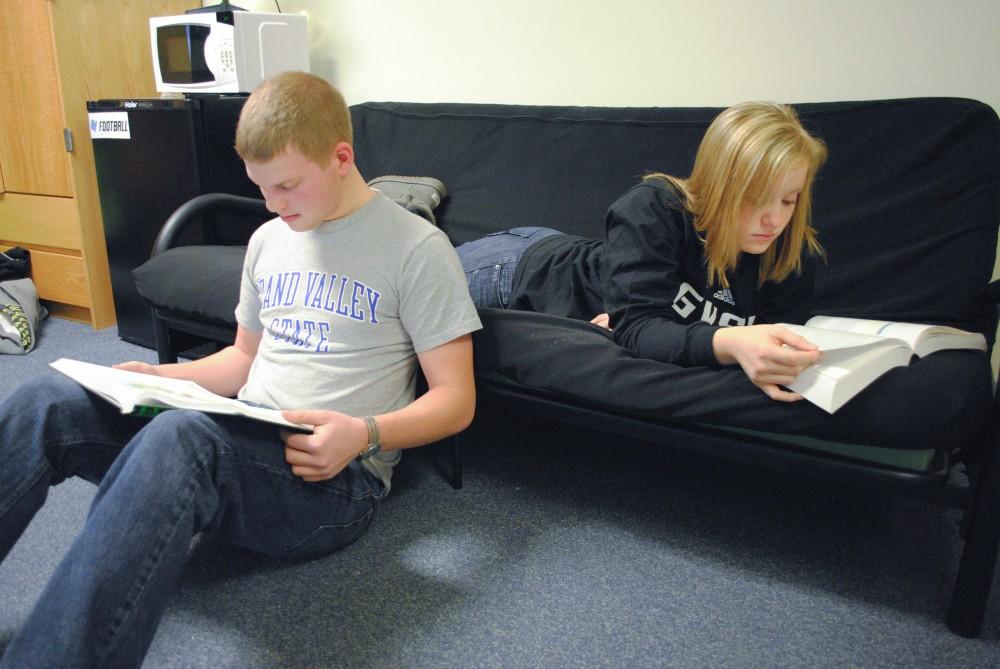LGBT community pushes for gender-neutral housing

Opposite-sex roommates
Dec 6, 2010
An increasing number of Grand Valley State University students and resident assistants are pushing for a gender-neutral housing option to allow students to pick their roommates regardless of gender or sexual orientation.
The request, largely driven by the LGBT student population, gained momentum when GVSU’s Students Advocating for Freedom and Equality held a panel discussion on the issue at the end of November. Now, the group plans to circulate petitions and ask other student groups for support before presenting a formal request to administrators next semester.
Currently, only two universities in Michigan include gender-neutral housing options. The University of Michigan offers gender-neutral bathrooms and housing assignments to transgender students on a case-by-case basis. Kalamazoo College also evaluates gender-neutral roommate requests on a case-by-case basis. About 50 universities nationwide offer similar housing options.
However, director of Housing and Health Services Andy Beachnau said GVSU’s own policy is unlikely to change soon.
“Currently our policy is to assign students by gender,” he said. “I do not see this policy changing in the near future.”
Beachnau said housing assignments are based solely on gender and do not factor in students’ sexual orientation. If a same-sex couple requests to live together, they undergo the same application process as when two heterosexual students of the same gender put in a request.
“Students are assigned by gender,” Beachnau said. “(There is) no difference.”
If a student reports they are transgender, Housing assigns them to a single-occupancy dorm or apartment.
National Student Genderblind Campaign co-founder Jeffrey Chang said the recent suicide of a bullied student at Rutgers University sparked an expanded nationwide discussion of gender-neutral housing.
Founded in 2006, NSGC works to promote gender equality and inclusiveness at colleges across the country. The NSGC has worked with numerous colleges, including the University of Michigan, to promote gender-neutral housing. Chang said the NSGC is also interested in supporting GVSU students to rally for gender-neutral dorms and to discuss potential housing options with administrators.
He explained many LGBT students fear they will not be accepted when they room with a student of the same sex or with a stranger.
“Oftentimes, gay, lesbian or transgender students don’t feel safe or don’t feel comfortable being forced to live with students of the same sex,” he said. “I think the tragedy at Rutgers really highlights the need to make LGBT students feel safe. Last week I was talking to another student who told me he decided to move off-campus because he told me he wouldn’t feel safe living on campus and living with someone who he didn’t know if they would accept him being gay.”
Chang added placing transgender students in single rooms is a common but ultimately unfair practice.
“This is the standard operating procedure at most schools in the country, and I think it’s really, really horrible,” he said. “I think it’s important that trans students have a wide variety of options. I think trans students should be able to live in a single room if they want to, but that shouldn’t be the only option available to them… These single rooms obviously cost more and these students have to pay the rate.”
Some argue gender-neutral housing has the potential to promote promiscuity and increase the likelihood of sexual assault or domestic violence. But in Chang’s experience surveying colleges with gender-neutral housing options, he said he has found no validity to these fears. In fact, of the schools surveyed, administrators reported only 2 to 3 percent of students opted to live with roommates of the opposite sex and usually lived with a friend rather than a romantic partner. While most students chose not to live with an opposite sex roommate, Chang believes in the importance for students to have the option available.
Under current university policy, GVSU students of opposite genders can only live together on campus if they are legally married or parenting a child.
Junior Matthew Brainovich recently had his request to live with a friend of the opposite sex denied by Housing. In the end, he and his roommate chose to live off campus. Brainovich said he thinks Housing’s same-sex-only policy is antiquated and unnecessary.
“I don’t feel it’s discriminatory. It’s just outdated,” he said. “I can understand if they were concerned where someone was trying to live with their girlfriend or boyfriend, and then they break up. But you should be able to live with a friend of the opposite sex if you want to. It’s a stupid policy and it’s unnecessary.”
Chang agreed as male-female friendships become increasingly common, university policies should change to reflect those trends.
“Male and female students are far more likely to be friends than ever before,” Chang said. “You shouldn’t be restricted to live with a roommate just because of your gender. Increasing the number of options for all students is just really important.”
Dean of Students Bart Merkle told the Grand Rapids Press last week that while the university welcomes a free exchange of ideas amongst students, such discussion would not necessarily lead to a change in actual policy.























